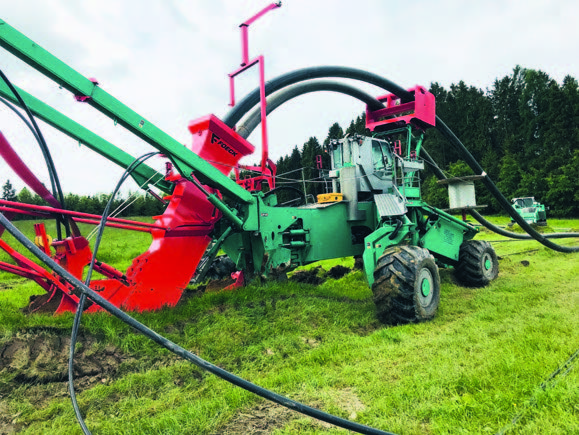Wirtschaftsforum: Mr Föckersperger, since the company was founded in 1931, your company has laid more than 450,000 km of cables and pipes all over the world. Today you are the market and technology leader for trenchless installation systems. What were the most important milestones in the more than 90 years of the company's history?
Bernhard Föckersperger: It all started with an agricultural machinery and bicycle trade and a repair workshop. In 1958, my father, Walter Föckersperger senior, and my grandfather Georg developed the first laying system for cables and pipes, which did not require digging up the ground and was also suitable for difficult ground conditions and types of terrain, such as on slopes. The system consisted of two machines, a laying plough and a winch vehicle. Since then, we have continued to develop the system. The machines became more powerful and larger. In 1974, the first extremely all-terrain spider plough with all-wheel drive came onto the market. We have been internationally active since 1989. Today, we sell our installation system on all continents; our name is regarded worldwide as the benchmark for trenchless systems.
Wirtschaftsforum: What are the main advantages of your trenchless installation system?
Bernhard Föckersperger: The extremely high quality and laying speed. Compared to conventional laying in open trench construction, only one work step is required. This enables us to achieve an unprecedented output of up to 10,000 m per day. With a tractive force of up to 360 t, we offer the world's most powerful laying system. Our system is suitable for all cables and pipes, from fibreglass to 630 mm diameter pipes, and for all ground conditions, whether gravel, swamp, sand or through water. And due to the trenchless technology, the interference with nature is kept to an absolute minimum.
Wirtschaftsforum: How has the Corona crisis affected your business?
Bernhard Föckersperger: In the last two years, many projects of potential clients were postponed, consequently also our orders. And we were not able to support them on site. At the moment, it is mainly the supply chain problem that is causing us problems; certain supplier parts have extremely long delivery times. But we have taken precautions in good time; it only gets difficult with very short-term orders. We have a high vertical range of manufacture, including steel construction and electrical wiring, which helps. We buy in components such as engines and hydraulics, etc.
Wirtschaftsforum: Do you use digital technology in your installation systems?
Bernhard Föckersperger: Our systems support remote diagnostics and remote maintenance to assist customers with problems. Recording devices with GPS can be installed on the machine to document the exact position of the supply line during laying, so there is no need to survey afterwards. Our laying ploughs are radio-controlled and thus offer more work safety.
Wirtschaftsforum: The high speed of your systems also saves you resources.
Bernhard Föckersperger: Yes, we lay 10 to 20 times faster than comparable systems. That means less diesel consumption and fewer CO2 emissions. And due to the long service life of our machines, we have a significantly lower overall carbon footprint than other suppliers.
Wirtschaftsforum: What are your main markets?
Bernhard Föckersperger: We have customers all over the world, such as Southeast Asia, the Middle East, Africa, South and North America, and of course Europe. Germany lags behind in infrastructure development, our bureaucracy often gets in the way. For example, 1,200 km were laid in Indonesia with our system and two machinists, that would not be possible here in Germany.
Wirtschaftsforum: To what do you mainly attribute your worldwide success?
Bernhard Föckersperger: We have a solid, highly reliable product with the highest installation performance on the market. We always work solution-oriented and close to the customer and his requirements. In addition, the trenchless method offers significantly higher operational safety compared to open trenches.
Wirtschaftsforum: What are your short and medium-term targets for the company?
Bernhard Föckersperger: In the short term, we want to maintain our delivery performance and further develop the machines: less energy consumption and more ergonomics. In the medium term, we are committed to making quality in laying more important again in Germany. Abroad, people are already much further ahead. Furthermore, at some point the company will be handed over from the current owner Walter Föckersperger to his son Daniel Föckersperger, and thus to the 4th generation.
Download orig. report with more pictures
